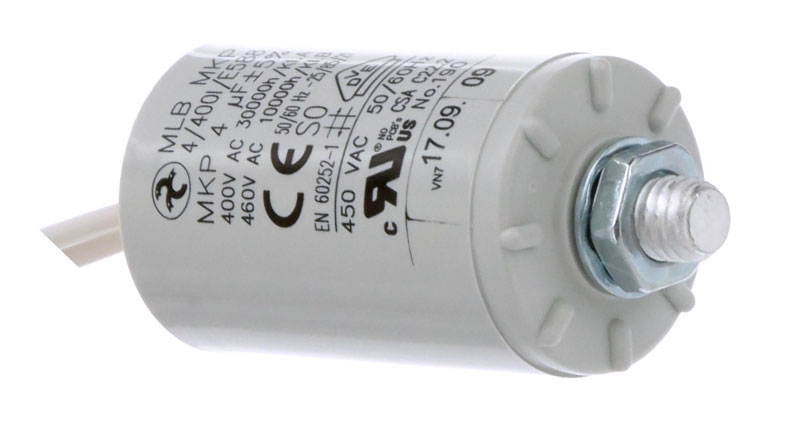
Manufacturers of washing machines equip their products with starting capacitors. These barrel-shaped parts are installed inside the housing. What is the purpose of a capacitor in a washing machine and is it possible to operate the equipment without it?
The capacitor is installed in washing machines to start the asynchronous motor. This universal device can be used in any devices with this type of motor. The capacitor is connected in series to the starting winding. It is needed to create and maintain a leading phase current at the moment of starting.
When a delay in magnetization of the starting winding occurs, a rotating magnetic field is created. Its functions are to increase torque and facilitate engine starting. As the rotor picks up speed, the starting capacitor switches off. If the washing machine does not have a starting element for one reason or another, the working winding is damaged and burns out. The capacitor is a self-healing part that functions normally after a breakdown.
An important characteristic of the starting capacitor is its nominal capacity. The higher it is, the better the device accumulates and stores charge. Over time, the capacity of the capacitor in the washing machine decreases. To check this indicator and evaluate the performance of the device, you will need a multimeter.
It is necessary to measure the current capacity of the capacitor and compare it with the value indicated on the case. The experts warn: the measurement has its own peculiarities. If you use a regular inexpensive multimeter, you will only be able to check whether the starting element is working properly. To do this, you need to:
To measure the working capacity of a capacitor more accurately, you need a professional multimeter. It is equipped with special connectors. When measuring, you can adjust the plug. Before starting work, the tester is set to the indicator indicated on the capacitor body. Then proceed as follows:
If the deviation from the norm is significant, then the capacitor is damaged. It must be replaced. If the difference between the working and nominal capacity is insignificant, the starting element is in good condition.
To check the operation of the capacitor, you can measure its voltage. To do this, you need a power source whose voltage is less than that of the element. For example, if the capacitor voltage is 25 V, then it is enough to take a 9 V power source. The testing principle is similar to the previous one: you need to measure the voltage of the working capacitor and compare it with the standard one.
Using the tester control knob, select the ohmmeter mode and attach the probes to the capacitor legs. Check that the polarity is observed. After a few seconds, the tester display will show the measurement result. If it corresponds to the norm, the starting device is working properly. If the indicator deviates significantly from the nominal value, the capacitor must be replaced.
Copyright © 2020 Coimbatore Service.